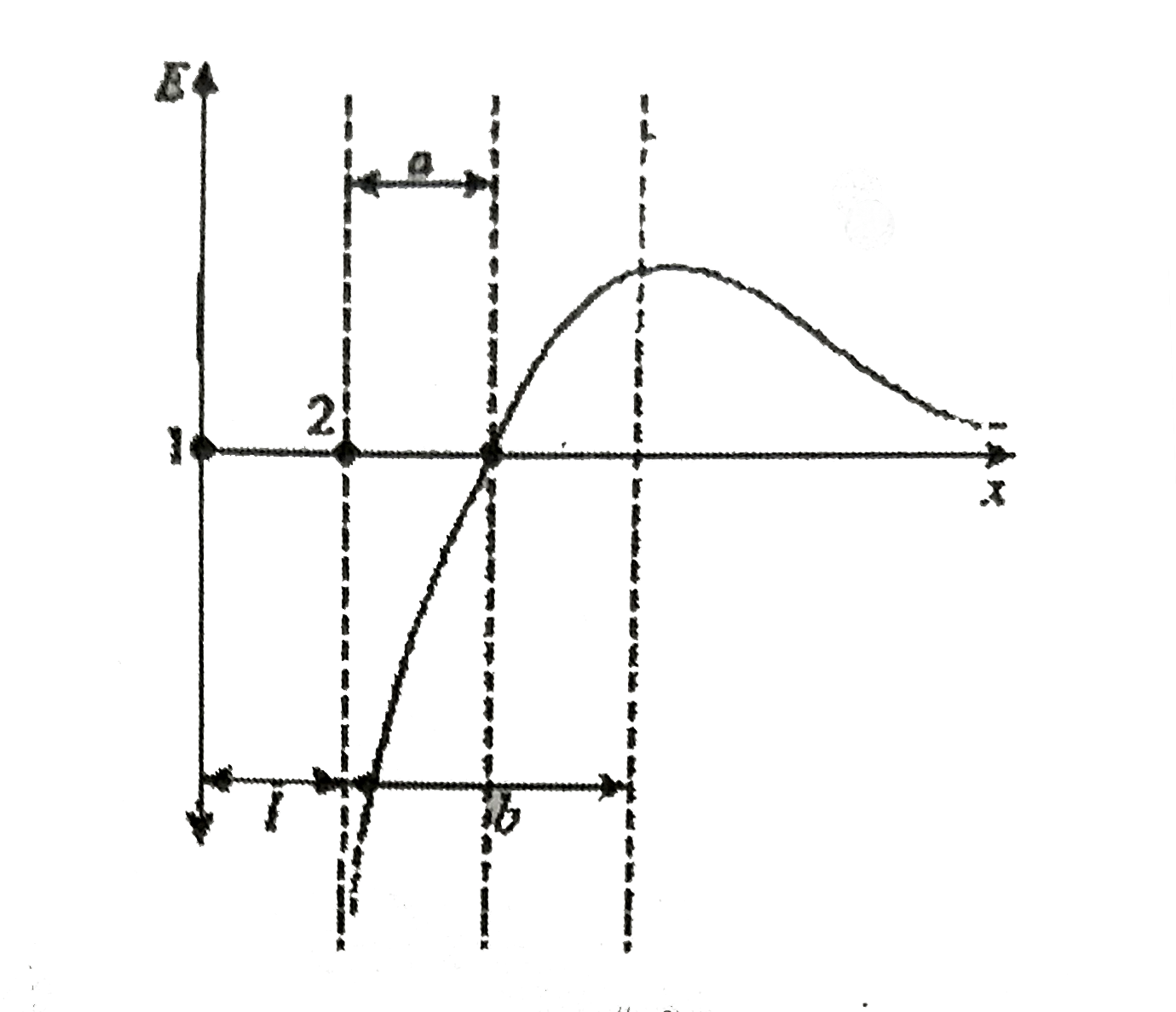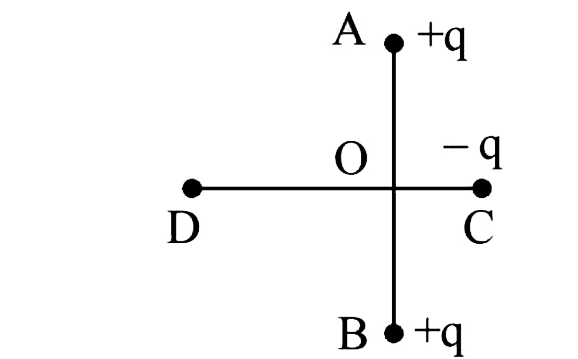Two fixed charges 4Q (positive) and Q (negative) are located at A and Bthe distance AB being 3m

The point P where the resultant field due to both is zero is on AB outside AB
The point P where the resutlant field due to both is zero is on AB inside AB
If a positive charge is placed at P and displaced slightly along AB it will execute oscillations.
If a negative charge is placed at P and displaced slightly along AB it will execute oscillations.
The correct Answer is:A,D
Use coulomb's law under equilibrium concept
Topper's Solved these Questions
- BOOK - NARAYNACHAPTER - ELECTROSTATICS AND GAUSS LAWEXERCISE - Passage I3videos
ELECTROSTATICS AND GAUSS LAW
- BOOK - NARAYNACHAPTER - ELECTROSTATICS AND GAUSS LAWEXERCISE - Passage II3videos
ELECTROSTATICS AND GAUSS LAW
- BOOK - NARAYNACHAPTER - ELECTROSTATICS AND GAUSS LAWEXERCISE - NCERT based Question14videos
ELECTROSTATICS AND GAUSS LAW
- BOOK - NARAYNACHAPTER - ELECTROSTATIC POTENTIAL AND CAPACITANCEEXERCISE - ADDITIONAL PROBLEMS14videos
ELECTROSTATIC POTENTIAL AND CAPACITANCE
- BOOK - NARAYNACHAPTER - EXPERIMENTAL PHYSICSEXERCISE - Comprehension type6videos
EXPERIMENTAL PHYSICS
Similar Questions
Two point charges Q1 and Q2 are positioned at points I and 2. The field intensity to the right of the charge Q2 on the line that passes through the two charges varies according to a law that is represented in the figure. The field intensity is assumed to be positive if its direction coincides with the positive direction on the x-axis. The distance between the charges is l.

(a) Find the sign of each charge
(b) Find the ratio of the absolute values of the charges ∣∣∣Q1Q2∣∣∣
(c) Find the value of b where the field intensity is maximum
[(a) Q2 is negative and Q1 is positive (b) (l+aa)2, (c) l(l+aa)2/3−1⎤⎥ ⎥ ⎥⎦View SolutionTwo positive charges q1 and q2 are located at the points with redius vectors r1 and r2. Find a negative charge q3 and a radius vector r3 of the point at which it has to be placed for the force acting on each of the three charges to be equal to zero.
View Solution
Knowledge Check
- Question 1 - Select One
Two fixed charges 4Q (positive ) and q (negative ) are located at A and B , ther distance AB being 3m.
 .AThe point P where the resultant field due to both is zero is on AB outside ABBThe point P where the resutlant field due to both is zero is on AB inside ABCIf a positive charge is placed at P and displaced slightly along AB it will execute oscillations.DIf a negative charge is placed at P and displaced slightly along AB it will execute oscillations.
.AThe point P where the resultant field due to both is zero is on AB outside ABBThe point P where the resutlant field due to both is zero is on AB inside ABCIf a positive charge is placed at P and displaced slightly along AB it will execute oscillations.DIf a negative charge is placed at P and displaced slightly along AB it will execute oscillations. - Question 2 - Select One
Two fixed charges −2Q and Q are locatted at the points with coordinates ( -3 a, 0) and (+3 a, 0) prespectively in the X−Y plane .
The expression for the potential V(x) at a general point on the x-axis is given by .AV(x)=14πɛ0[Q3a−x−2Q(3a+x)]for0<x<3aBV(x)=14πɛ0[2Q3a−x−2Q(3a+x)]for0<x<3aCV(x)=14πɛ0[Q3a−x−2Q(3a+x)]for0<x<3aDV(x)=14πɛ0[Q3a−x−2Q(3a+x)]for0<x<3a - Question 3 - Select One
Two charges +Q and −2Q are located at points A and B on a horizontal line as shown below
The electric field is zero at a point which is located at a finite distance
 Aon the perpendicular bisector of ABBleft of A on the lineCbetween A and B on the lineDright of B on the line
Aon the perpendicular bisector of ABBleft of A on the lineCbetween A and B on the lineDright of B on the line
Two fixed, equal, positive charges, each of magnitude 5×10−5 coul are located at points A and B separated by a distance of 6m. An equal and opposite charge moves towards them along the line COD, the perpendicular bisector of the line AB.
The moving charge, when it reaches the point C at a distance of 4m from O, has a kinetic energy of 4 joules. Calculate the distance of the farthest point D which the negative charge will reach before returning towards C.
 View Solution
View SolutionTwo negative charges of a unit magnitude and a positive charge q are placed along a straight line. At what position and value of q will the system be in equilibrium? (Negative charges are fixed).
View SolutionA particle of mass m and charge +q is located midway between two fixed charged particles each having a charge +q and at a distance 2L apart. Assuming that the middle charge moves along the line joining the fixed charges, calculate the frequency of oscillation when it is displaced slightly.
View SolutionTwo fixed charges −2Q and +Q are located at points (−3a,0) and (+3a,0) respectively. Then which of the following statement is correct?
View SolutionA particle of mass m and charge q is located midway between two fixed charged particles each having a charge q and at a distance 2L apart so that distance of this charge from each charge located at end is L. Assuming that the middle charge moves along the line joining the fixed charges. The frequency of oscillation when it is displaced slightly is
View Solution

